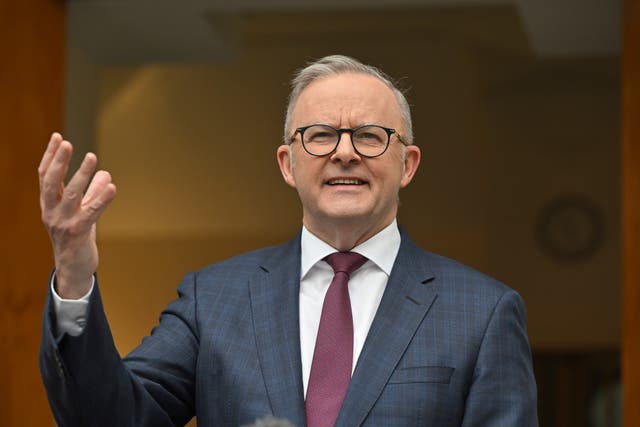
Australia’s states and territories on Friday unanimously backed a national plan to require most forms of social media to bar children younger than 16.
Leaders of the eight provinces held a virtual meeting with prime minister Anthony Albanese to discuss what he calls a world-first national approach that would make platforms including X, TikTok, Instagram and Facebook responsible for enforcing the age limit.
“Social media is doing social harm to our young Australians,” Mr Albanese told reporters. “The safety and mental health of our young people has to be a priority.”
The government leaders had been discussing for months setting a limit, considering options from 14 to 16 years of age.
While Tasmania would have preferred 14, the state was prepared to support 16 in the interests of achieving national uniformity, Mr Albanese said.

The legislation will be introduced into Parliament within two weeks, and the age ban would take effect a year after it passes into law, giving platforms time to work out how to exclude children. The government has yet to offer a technical solution.
The delay is also intended to allow time to address privacy concerns around age verification.
The main opposition party has given in-principle support to the 16-year age limit since it was announced on Thursday, suggesting the legislation will pass the Senate.
The minor Greens party was critical, saying the ban would prevent the emergence in Australia of future child environmental activists like Sweden’s Greta Thunberg.
More than 140 academics with expertise in fields related to technology and child welfare signed an open letter to Mr Albanese last month opposing a social media age limit as “too blunt an instrument to address risks effectively”.
Critics say most teenagers are tech savvy enough to get around such laws. Some fear the ban will create conflicts within families and drive social media problems underground.
Meta, which owns Facebook and Instagram, argues that stronger tools in app stores and operating systems for parents to control what apps their children can use would be a “simple and effective solution”.
The government likens the proposed social media age limit to the laws that restrict the sale of alcohol to adults aged 18 and older across Australia. Children still find ways to drink, but the prohibition remains.
“We think these laws will make a real positive difference,” Mr Albanese said.
But Lisa Given, professor of information sciences at RMIT University, described the legislation as “really problematic”.
“Many of our social networks are actually about the provision of extremely critical information to kids,” Ms Given told Australian Broadcasting Corp.
“There’s no doubt that they’re also facing bullying and other challenges online, but they actually need the social supports to know how to navigate the platforms safely and so they need more support from parents, from care-givers, not less access to a single or multiple platforms.”
Communications minister Michelle Rowland said children would retain access to online education and health services.
The legislation would also include strong privacy protections surrounding age verification.
“Privacy must be paramount, including that of children,” Ms Rowland said. “We should also be very clear about the realities. These platforms know about their users in a way that no one else does.”
Ms Rowland said YouTube would likely be included among the mainstream platforms defined under the legislation as age restricted services.
But YouTube Kids could be exempted. Gaming and messaging services would not face age restrictions, she said, adding: “This legislation would strike a balance between minimising the harms experienced by young people during a critical period of their development while also supporting their access to benefits as well.”


Why are you making commenting on The Herald only available to subscribers?
It should have been a safe space for informed debate, somewhere for readers to discuss issues around the biggest stories of the day, but all too often the below the line comments on most websites have become bogged down by off-topic discussions and abuse.
heraldscotland.com is tackling this problem by allowing only subscribers to comment.
We are doing this to improve the experience for our loyal readers and we believe it will reduce the ability of trolls and troublemakers, who occasionally find their way onto our site, to abuse our journalists and readers. We also hope it will help the comments section fulfil its promise as a part of Scotland's conversation with itself.
We are lucky at The Herald. We are read by an informed, educated readership who can add their knowledge and insights to our stories.
That is invaluable.
We are making the subscriber-only change to support our valued readers, who tell us they don't want the site cluttered up with irrelevant comments, untruths and abuse.
In the past, the journalist’s job was to collect and distribute information to the audience. Technology means that readers can shape a discussion. We look forward to hearing from you on heraldscotland.com
Comments & Moderation
Readers’ comments: You are personally liable for the content of any comments you upload to this website, so please act responsibly. We do not pre-moderate or monitor readers’ comments appearing on our websites, but we do post-moderate in response to complaints we receive or otherwise when a potential problem comes to our attention. You can make a complaint by using the ‘report this post’ link . We may then apply our discretion under the user terms to amend or delete comments.
Post moderation is undertaken full-time 9am-6pm on weekdays, and on a part-time basis outwith those hours.
Read the rules here